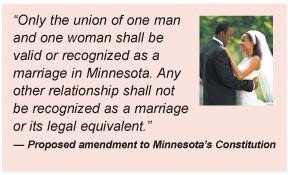GUEST POST -- God and Children: Two crucial elements in same-sex marriage debate -- by Charles H. Darrell
Posted by Craig Westover | 7:04 PM |Charles Darrell has posted several comments to my Conservative Gay Marriage 101 post emphasizing the black experience with "non-traditional families" as evidence to support passage of the Minnesota Marriage Amendment. He laments that supporters of same-sex marriage do not put more weight on this evidence. In the give and take of the comments on the 101 post, I've stated why I believe that evidence is irrelevant to the question of same-sex marriage . I've offered Chuck this space to make his case to "a candid world."
 OK, I give up. I can’t imagine a single example of how same-sex-marriage will affect my own heterosexual marriage, and since I can’t predict the future, the “slippery slope towards societal decadence” argument is hard to prove as well. Furthermore, as arguments based on religious faith have been banned from the public square, I must admit to rethinking my opinions.
OK, I give up. I can’t imagine a single example of how same-sex-marriage will affect my own heterosexual marriage, and since I can’t predict the future, the “slippery slope towards societal decadence” argument is hard to prove as well. Furthermore, as arguments based on religious faith have been banned from the public square, I must admit to rethinking my opinions.Maybe we’re asking the wrong questions. Is my marriage the salient issue? Does it matter what happens to marriage as we know it? Is it truly a matter of tolerance and civil rights? Is it fair to frame the debate as “two individuals in a loving and committed relationship”? Do we have enough sociological or legal data to articulate a wise and informed decision?
Another Viewpoint
Yes, some people insist same-sex-marriage is about tolerance and civil rights, and attempt to draw a moral analogy between it and school desegregation or inter-racial marriage. But I hear the opposite from those with the wisdom to be consulted — the African-American community and minorities of faith in general.
Last May I attended a Minnesota Senate Judiciary Committee session that heard testimony from both sides of the same-sex-marriage debate. I was struck by the solidarity of support for traditional marriage shared by leaders from African-American, Somali, Jewish, Hmong, Islam, Coptic, Catholics, and Hispanic communities of faith. Furthermore, each of these leaders based his view on God’s law.
In particular, the Rev. John R. Thomas, Jr. stated flatly that SSM was not a civil-rights issue — and was in violation of God’s law. He added that Rosa Parks did not go to the front of the bus to support sodomy. A few months ago 100 black clergy met in Atlanta to object to the comparison of same-sex-marriage to the civil-rights movement. In a Seattle Times editorial, “Gays are not the nation’s new African Americans,” Ken Hutcherson writes that even Jesse Jackson is opposed to the analogy of same-sex-marriage and the civil rights movement of the 1960s.
Stephen Carter in The Culture of Disbelief reveals that “reluctance to acknowledge the religious content of the civil rights movement is a close cousin to another societal blind spot: the refusal to admit the centrality of religion to most of the black community itself.” Carter cites Martin Luther King’s “Letter from Birmingham City Jail,” in which King states, “A just law is a man-made code that squares with the moral law or the law of God.”
Blind spot indeed. Clearly, the moral justification for the civil rights movement was based on the “law of God.” As this same law prohibits homosexual relationships, a civil rights-based argument seems misinformed and fails to acknowledge the legitimacy of a faith-based dialogue in the public square. Perhaps civil rights is the new “civil religion.”
What about the Kids?
Throughout the entire debate, one question seems to be overlooked: How will same-sex-marriage affect children? There is a mountain of sociological data that demonstrates the best environment for a child is in a home with a mother and father. Nowhere is this more obvious than in the African-American communities where leaders, such as Starr Parker, contend that a child needs more than just a mother, or even two loving persons of the same sex. Starr points out that many blacks have attempted to raise children with a mom and grandma, and found it wanting.
In Why Children Need Father-Love and Mother-Love, Glen Stanton writes, “To be concerned with proper child development is to be concerned about making sure that children have daily access to the different and complementary ways mothers and fathers parent. If Heather is being raised by two mommies and Brandon is being raised by two daddies, Heather and Brandon might have two adults in their lives, but they are being deprived of the benefits found in the unique influences found in a mother and father’s differing parenting styles. Much of the value mothers and fathers bring to their children is due to the fact that mothers and fathers are different. And by cooperating together and complementing each other in their differences, they provide these good things that same-sex caregivers cannot.”
It seems mean-spirited to say that “people who believe that children need mothers and fathers are the legal and moral equivalents of racists.” If we are truly concerned about civil rights and diversity, then we should take steps to protect a child’s right to the diversity of a man and woman, married, and in the home.
Charles Darrell is a free-lance writer living in Woodbury. He is Communications Director for Minnesota for Marriage. He can be reached at chdarrell@msn.com

<< Home